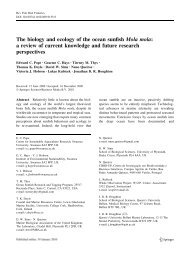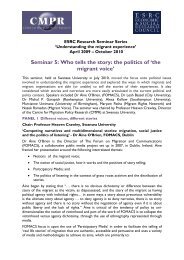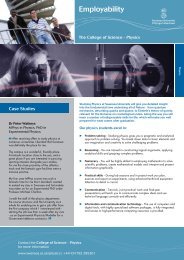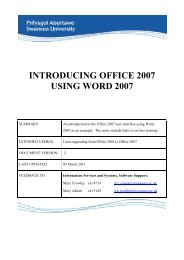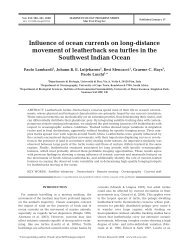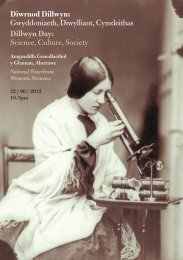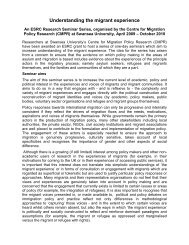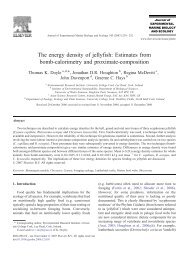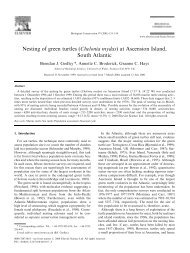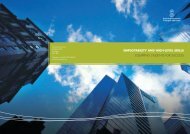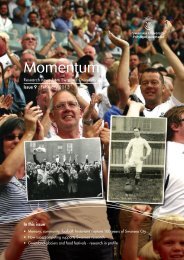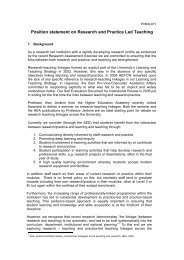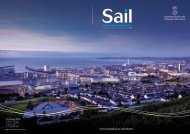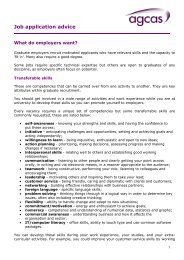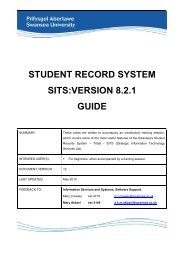Postgraduate Prospectus 2013 - Swansea University
Postgraduate Prospectus 2013 - Swansea University
Postgraduate Prospectus 2013 - Swansea University
You also want an ePaper? Increase the reach of your titles
YUMPU automatically turns print PDFs into web optimized ePapers that Google loves.
Computer Science<br />
Research opportunities<br />
MPhil/PhD, MRes<br />
One year MSc by Research<br />
programmes are also available<br />
in the following specialist areas:<br />
• Graphics<br />
• Human-computer interface<br />
• Theoretical computer science<br />
RAE2008 70% of research<br />
rated world-leading (4*) or internationally<br />
excellent (3*)<br />
Professors<br />
F G Moller<br />
M Jones<br />
P D Mosses<br />
H W Thimbleby<br />
J V Tucker<br />
Computer Science affects every aspect of<br />
our lives, placing increasing demands on<br />
education, business, and industry to<br />
ensure that the workforce of the future is<br />
equipped with the skills necessary to<br />
thrive in the Digital Age. Computer<br />
Science at <strong>Swansea</strong> is at the heart of the<br />
technological innovation that is redefining<br />
the way we live, learn, and work.<br />
The Department welcomes proposals for<br />
postgraduate research projects that<br />
complement its research interests –<br />
please see: www.swansea.ac.uk/<br />
compsci/research/index.html for<br />
further information.<br />
A research degree in Computer<br />
Science will:<br />
• provide you with new and<br />
specialised research skills<br />
• prepare you for a career in<br />
academic research and teaching<br />
• equip you with skills relevant for a<br />
rewarding career in a range of diverse<br />
fields, including software development<br />
and Internet systems<br />
Academic and research staff 30<br />
<strong>Postgraduate</strong>s 70<br />
Entry requirements:<br />
PhD, MPhil, normally a 2.1 Honours degree<br />
in Computer Science, Mathematics, or a<br />
closely related discipline.<br />
English Language requirement:<br />
IELTS 6.5 (with a minimum of 5.5 in each<br />
component) or <strong>Swansea</strong> <strong>University</strong><br />
recognised equivalent.<br />
Research Strengths<br />
The Department’s research interests are<br />
based on algorithms, programs and<br />
systems, rather than on the construction of<br />
hardware, so a sound background in<br />
programming and/or mathematics is a<br />
prerequisite for most projects. There are<br />
currently three broad areas of research:<br />
Algebraic and Logical Methods for the<br />
Design of Software and Hardware<br />
Research focuses on the mathematical<br />
analysis of fundamental problems<br />
concerned with algorithms, programs and<br />
programming languages, and machines.<br />
The group is at the forefront of research for<br />
example in the following areas:<br />
• computations on topological data<br />
types such as the real numbers and<br />
on infinite data streams<br />
• higher-order and component-based<br />
methods for programming language<br />
semantics<br />
• type theory and its applications in<br />
programming technologies<br />
• operational semantics that give meaning<br />
to concurrent systems, and the use of<br />
game theory, particularly the study of<br />
winning strategies, in understanding<br />
verification problems<br />
Scholarships and Bursaries<br />
A range of postgraduate scholarships<br />
and bursaries is normally available. For<br />
details, please visit www.swansea.ac.uk/<br />
scholarships/<strong>Postgraduate</strong><br />
Each year, the Department is able to<br />
offer a number of EPSRC studentships to<br />
research students. Research work is currently<br />
supported by a range of grants from funding<br />
councils, the EU, and industry. In some<br />
cases, these provide research studentships.<br />
• the satisfiability problem (SAT)<br />
considered in a broad perspective,<br />
ranging from theoretical foundations to<br />
practical implementations<br />
• general algebraic methods for modelling<br />
microprocessors<br />
• algebraic theory of synchronous<br />
concurrent algorithms (SCAs), and<br />
application of SCAs to the specification<br />
of scientific simulation in areas such<br />
as physiology<br />
• infinite-state automata theory, particularly<br />
structural technologies for analysing<br />
large general computing systems<br />
Computer Graphics and Visualisation<br />
The group has a leading position in the<br />
new field of volume graphics and<br />
contributes to the development and<br />
application of multimedia communications.<br />
The group has made significant<br />
contributions in the following areas:<br />
• constructive volume geometry as an<br />
algebraic framework for volume<br />
graphics, and software tools for<br />
modelling and rendering complex<br />
multivolume scenes<br />
• distance field and its use in voxelisation<br />
of complex objects, and efficient<br />
algorithms for computing distance<br />
fields, and hypertextures<br />
How can I find out more?<br />
Visit our website:<br />
www.swansea.ac.uk/compsci<br />
Contact the <strong>Postgraduate</strong><br />
Recruitment Officer:<br />
Tel: +44 (0)1792 295142<br />
Contact the Admissions Tutor:<br />
Email: o.kullmann@swansea.ac.uk<br />
Tel: +44 (0)1792 513369<br />
• algorithms for deformation<br />
and animation<br />
• efficient direct volume<br />
rendering techniques<br />
• non-photorealistic rendering techniques<br />
• software tools for rapid implementation<br />
of software systems involving remote<br />
collaboration and multimedia<br />
communication<br />
• scalable virtual environments and<br />
knowledge-based user interfaces<br />
• industrial applications in the<br />
management of commercial software<br />
development and maintenance using<br />
Internet/intranet-based multimedia<br />
communications<br />
• 3D volumetric display technology<br />
Future Interaction Technologies<br />
Future Interaction Technologies (FIT) refers,<br />
broadly, to complex devices that have<br />
immediate impact on our lives, for better<br />
or worse – whether in our homes, cars,<br />
mobile phones or medical devices, etc.<br />
The research of the FIT Lab focuses on<br />
evaluating and changing design through<br />
better human-orientated tools, technology,<br />
models and methods.<br />
Its aim is to improve quality of life by<br />
addressing key technological challenges<br />
Visit the <strong>University</strong>:<br />
see page 174 for details<br />
Applications can be made online<br />
at: www.swansea.ac.uk/applyonline<br />
– see pages 176 – 177 for further<br />
information<br />
For details of the Master’s courses<br />
available in Computer Science, please<br />
see page 40.<br />
that are relevant to the whole of society.<br />
Interests include research focused on the<br />
digital divide, mobile information seeking,<br />
education and patient care.<br />
Facilities<br />
• Computing facilities are based on<br />
a fibre optic backbone and<br />
1G switched fast Ethernet LANs<br />
• <strong>Postgraduate</strong> laboratories are equipped<br />
with modern workstations running Linux,<br />
Windows XP/Vista, Solaris and<br />
Mac OS X<br />
• Workstations are served by a<br />
high-performance computing<br />
infrastructure comprising a 68-processor<br />
cluster architecture, an eight-processor<br />
computation engine, and several<br />
terabyte servers<br />
• PhD and MPhil students are allocated<br />
a desk and their own computing<br />
facilities in the research laboratory<br />
• The Department is an institutional<br />
member of the Association for<br />
Computing Machinery and the<br />
British Computer Society<br />
Research Degrees – Computer Science<br />
102<br />
103



